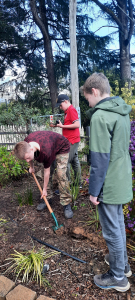Digging Deep for National Tree Day Debut
Cire Community School enthusiastically dug deep for its first National Tree Planting Day on July 29, pitching in for the environment and helping beautify outdoor spaces at the Mount Evelyn and Lilydale campuses.
Thanks to the driving force of project lead and Cire teacher Jennie Ralph, the school secured broad community support through donated seedlings and equipment with students, staff and volunteers happily working side by side to plant more than 50 natives across two campuses.

Cire Community School’s Logan Bridgewater puts some muscle into digging, ahead of Logan Newton (red shirt) and Ben Droscher.
Established in 1996 and with Toyota as a major sponsor, National Tree Day has grown into Australia’s largest community tree planting and nature care event. The program is a call to action for all Australians to get their hands dirty and give back to their community.
Since 1996 26 million trees have been planted by five million volunteers donating 10 hours of their time.
For the Community School, this year’s event was a timely initiation, given Cire’s organisation-wide theme for 2022 is Sustainability.
Jennie Ralph said it was an amazing and beneficial experience for all involved and facilitated broader community connection through the support and donations from Yarra Valley Toyota and Croydon Toyota, Yarra Ranges Council, Candlebark Community Nursery at Mooroolbark, Karwarra Australian Plant Garden and Nursery at Kalorama, and Bunnings Bayswater and Lilydale.
The day was such a success that plans are already underway for 2023. Also, follow-up student activities will continue to enrich the school’s biodiversity through projects such as making bird feeders, revamping the composting system, and keeping important issues around Sustainability and the Indigenous perspective at the front.
“It was tremendous to see the sharing of expertise and skills at all levels by volunteers, staff, or green-thumbed students – everyone was able to shine by coaching others and/or taking the lead,”
“It was so good to see the joy of our students experiencing success and contributing.” said Jennie
The benefits of the day were many and varied:
- Everyone involved felt valued, contributing in some way, working as a team, whether digging, planting, assembling the plant protectors, watering or feeding.
- Gardening skills were developed
- Sense of being part of a team
- Learning skills to easily employ at home
- The anticipated long-term impact includes enhancing the biodiversity of the school
- Related/ integrated learning as students continue to think about their impact on the school; some are making bird feeders for the area to attract more wildlife, and others are looking at revamping the school’s composting system.
- Learning, respecting and appreciating the Indigenous perspective more in terms of edible and non-edible plants.
- Being quoted in the local paper and being in the school Blog!
- And, of course, planning for the event in 2023!
“I was able to help people dig and show them how to remove the plants safely from their pots”. Loges, student
“It was fun. I got to dig and plant trees”. Moth, student
Planet Ark research, sponsored by Toyota, shows how time in nature enhances and grows the key areas Australians consider the most important for a fulfilling life – health, happiness, learning, relaxation and relationships.

L-R: Emily (Bunnings Lilydale), Me! (Jennie Ralph), Moth De Silva, Brad Turner (AP), Logan Newton (rear), Riley Ker (front), Kaz (Bunnings Bayswater).
The report found that nature helps make people happier, healthier, brighter, calmer and closer. With people spending more and more time tethered to screens and devices, there’s never been a greater need to add nature to our lives.
The report titled Adding Trees – A Prescription for Health, Happiness and Fulfilment found:
- Just 10 minutes of relaxing outside are enough to reduce blood pressure significantly.
- Time in nature reduces a person’s chance of developing a range of diseases, including diabetes by 43%, cardiovascular disease and stroke by 37% and depression by 25%.
- Nature induces positive feelings through several physiological mechanisms, including activating the brain’s dopamine reward system.
- Students participating in outdoor learning programs perform better in reading, writing, maths and science, with 77% of teachers reporting student improvement in standardised tests.
- A strong connection to nature makes people more likely to feel passionate about relationships with their friends and family.
Click here for further information on Cire’s Community School educational programs.


